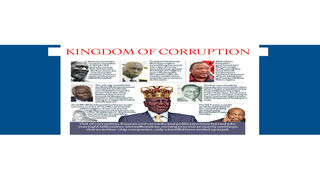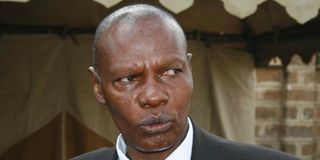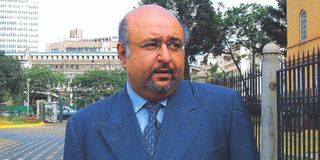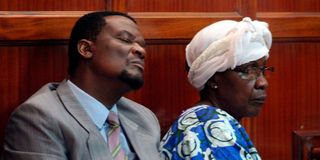
Weekly Review
Premium
Citadel of corruption: How Kenya’s civil servants have turned into overnight millionaires
When Zacharia Shimechero was jailed for five years in 1974, he became the only senior personality in President Jomo Kenyatta’s 15-year rule to be jailed over corruption. Shimechero was unlucky.
While out of corruption – rather than business – Kenyan civil servants and politicians have turned into overnight billionaires and millionaires, owning massive property and large shares in blue-chip companies, only a handful have ended up in jail.
When Shimechero was jailed in 1974 for five years for corruption, this became the first case in the Jomo Kenyatta presidency where a senior government official was jailed.
As a former Deputy Secretary in charge of Government Central Medical Stores, now Kenya Medical Supplies Agency, Shimechero was accused of corruptly receiving KSh144,000 from the director of Poly Chemists, Arvind Patel – who was also jailed – to supply goods without going through the tender board. The prosecutor, Sharad Rao, told the court that Shimechero used the money “to buy various properties” and that there was information that he was given a Mercedes Benz, too.
For the last eight months, major graft cases have either collapsed or have been abandoned by the Director of Public Prosecutions, ostensibly to spite the former Director of Criminal Investigations, George Kinoti, adding credence to a historical argument that Kenya’s elite were unwilling to tame runaway corruption. The first case of political impunity was recorded in 1964, when a maize scandal involving Cabinet Minister Paul Ngei broke. By today’s standards, the 1964 maize scandal was equivalent to the current cooking oil racket under Moses Kuria’s Trade ministry. Ngei, then the Minister for Co-operatives and Marketing, doubled as the chairman of the Maize Marketing Board.
At the time, Kenya was a net exporter of maize, mainly to Japan, and under Ngei’s watch, maize disappeared, leading to a crisis. While Kenyatta appointed a Commission of Inquiry, headed by Justice Chanan Singh, to probe corruption at Ngei’s ministry and the Maize Marketing Board, Ngei was never punished.

Former Nairobi town clerk John Gakuo. During his reign, alleys served their purpose as fire exits, as well as helping pedestrians manoeuvre from one point to another in the crowded capital.
The Commission instead redefined corruption: “There is no evidence before us showing “corruption” in the legal sense. In most instances, “unfairness” would be an appropriate description of what took place. People took unfair advantage of their positions as businessmen or politicians. In some cases, abuse of public office was involved,” said the report.
In 1969, six years after independence, Butere MP Martin Shikuku had challenged the government to form a judicial commission to investigate increasing corruption cases. He asked: “Is it a known fact that most of us (leaders) had very little in terms of wealth before we became leaders, and above all, before Kenya attained Independence? What do we now see after this short period of Kenya becoming independent?” Calling for the formation of a judicial commission, Shikuku said: “It would be fair for people in high positions to tell the country how they acquired the wealth they had within this short period.” But Attorney-General Charles Njonjo – one of the new millionaires – told Parliament that a commission of inquiry was not warranted. “I am myself satisfied that these matters are being dealt with satisfactorily,” he said, dismissing the formation of such a commission as a “waste of time and public funds”.
Shikuku was at it again in 1971, when he asked Parliament to set up a select committee on corruption, tribalism and nepotism. While this was passed, Jomo Kenyatta summoned the Kanu parliamentary group over the matter and it did not progress. Shikuku later alleged that tribalism and nepotism were used in picking members of the committee.
Ndegwa Commission of Inquiry
That year, the Ndegwa Commission of Inquiry, created to examine and investigate matters affecting the structure and remuneration of the public service,” presented a report recommending that civil servants be allowed to conduct business with the government within the same institutions they worked as long as it did not lead to a conflict of interest. In practice, it never worked.
Overnight, government offices were turned into spaces for commercial transactions in what has become a tradition. The import of the 1971 Ndegwa Report was that it sanitised what was previously known as corruption and civil servants became as rich people working in the private sector.
A few years later, in 1974, the small village of Chepkube in Bungoma was turned into a coffee smuggling hub by local politicians, security officers and government officials. Coffee worth millions of dollars stolen and smuggled from the volatile Uganda was brought into Kenya through this corridor, primarily using bicycles. The traders would transport it from ‘border to border’, the origin of the word boda-boda. It was a risky business and in June that year, veteran politician Kung’u Karumba, one of Kapenguria Six, disappeared without a trace in Uganda while on a ‘business’ trip.
As the elite grew rich, the poor began sliding down into the abyss. One of Kenyatta’s ministers, Dr Julius Kiano, was nicknamed “Mr Ten Per Cent”. Vocal MP JM Kariuki predicted Kenya would become a country of “10 millionaires and 10 million beggars”. It was a rhetorical projection because Kariuki was one of the “10 millionaires”, thanks to his shareholding in the gambling business and mining companies. In May, 1975, buoyed by the anger over the murder of JM Kariuki, Shikuku succeeded in moving a motion to “set up a select committee to probe corruption in Kenya”. It was the first challenge to the patron-client system that encouraged using public positions for private gain. For the first time, all the members were publicly supposed to declare their wealth – and they did.

Kenyan billionaire Ketan Somaia. He swindled more than Sh164 million out of Caneland Ltd through his collapsed Delphis Bank and Dolphin Holdings.
The death of Jomo Kenyatta saw President Daniel arap Moi ban smuggling (magendo) and it was hoped that corruption might end. During his 23-year reign, however, Moi’s Kanu regime turned the government into a den of corruption, while he projected the image of a religious man. Like Kenyatta, Moi used his office to acquire wealth and allowed his inner circle to do the same. Under Moi’s watch, mega-corruption was reported in almost all sectors, including energy, building of infrastructure and the sale of parastatals. Though the auditor-general captured this in his annual reports, no action was taken.
Meanwhile, land allocation became a key tool by which Moi bought loyalty, and government parastatals were turned into dens of sleaze. The political elite raided cash-rich institutions such as National Social Security Fund. But nothing surpassed the Goldenberg scandal, in which businessman Kamlesh Pattni raided the Treasury, and by the time he was done, taxpayers had lost $600 million.
While Moi had reluctantly set up the Kenya Anti-Corruption Authority at the insistence of donors, his appointment of Harun Mwau as the person to lead the fight was a surprise. To show his mettle, Mwau in 1998 arrested several Treasury officials, triggering a conflict between him and Finance minister Simeon Nyachae. Moi was forced to sack Mwau, and he was declared incompetent. Solicitor-General Aaron Ringera succeeded Mwau, but his tenure was cut short in December 2000, when the High Court ruled that the organisation was unconstitutional.
Moi left power before his government could prosecute any significant corruption case. It was hoped that Mwai Kibaki, elected on an anti-corruption ticket, would. But Kibaki abandoned previous opposition parties’ efforts to prosecute President Moi over corruption. As a result, those who had made their wealth illicitly during the Kanu regime got away scot-free. Nevertheless, Kibaki formed a Judicial Commission of Inquiry into the Goldenberg Scandal, which eased pressure on him to prosecute Moi.
Finally, Moi emerged unscathed in the judicial investigations, and though the Commission recommended the prosecution of Pattni and other masterminds, the cases collapsed in court. Pattni was later set free.
As a result, the only ‘big’ scandal that the Kibaki government managed to prosecute successfully involved the former Director of the National Aids Control Council, Dr Margaret Gachara, who was jailed for taking an exaggerated salary and allowances, and a former National Bank of Kenya official, Wellington Oluga, who was jailed together with billionaire Ketan Somaia over a KSh115 million London-look taxi scandal. The two were later set free by the High Court.

Sirisia MP John Waluke (right) and his associate Grace Wakhungu during a past court session. Waluke and Wakhungu would each have to pay a fine of more than Sh1 billion to avoid jail.
Kibaki’s tenure was tainted by the Anglo Leasing scandal in which billions of shillings were paid to phantom offshore companies. But still, there has yet to be any success in prosecuting the cases. Two weeks ago, the High Court set free businessman Deepak Kamani over the KSh3.6 billion scandal.
Others set free were senior government officials. Today, only one person, Sylvestor Mwaliko, a former Home Affairs Permanent Secretary, has been found guilty, earning him a fine of Sh3 million or three years in jail. While Uhuru Kenyatta’s government had filed more high-profile corruption cases than his predecessors combined, they have all been withdrawn by President William Ruto regime. During the election campaigns last year, Ruto accused President Kenyatta of using corruption cases to intimidate Ruto’s supporters.
The unlucky few who have been netted are not the usual symbols of corruption.
In 2012, Ms Rebecca Nabutola, former Tourism PS, and former Kenya Tourism Board Managing Director Dr Ochieng’ Ong’ong’a, were handed four-year prison sentences without the option of a fine for defrauding the Tourism ministry of Sh8.9 million.
In May 2018, former Nairobi Town Clerk John Gakuo was given a three-year jail term over a Sh283 million cemetery scandal, alongside former Local Government Permanent Secretary Sammy Kirui, former Nairobi City Council legal secretary Mary Ng’ethe and chairman of the City Council’s tender committee Alexander Musee. Gakuo died five months later.
Then there was a case involving MP John Waluke and his co-accused, Grace Wakhungu, who were fined over Sh700 million or an alternative of seven years in prison after they were found guilty of fraud in a KSh313 million maize scandal. They have appealed the sentence, and Waluke is still an elected MP.
With only a handful of people jailed for the last 60 years over mega-corruption, only the unlucky few have been caught. The sleaze continues.
@johnkamau1



